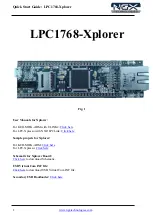
Block Diagram
http://www.motorola.com/computer/literature
3-13
3
Serial Communications Interface
The MCP750 uses a Zilog Z85230 Enhanced Serial Communications
Controller (ESCC) to implement the two serial communications interfaces,
which are routed through the transition module. The Z85230 supports
synchronous (SDLC/HDLC) and asynchronous protocols. The MCP750
hardware supports asynchronous serial baud rates of 110B/s to 38.4KB/s.
Each interface supports the CTS, DCD, RTS, and DTR control signals as
well as the TxD and RxD transmit/receive data signals, and TxC/RxC
synchronous clock signals. Since not all modem control lines are available
in the Z85230, a Z8536 CIO is used to provide the missing modem lines.
A PAL device performs decoding of register accesses and pseudo interrupt
acknowledge cycles for the Z85230 and the Z8536 in ISA I/O space. The
PBC controller supplies DMA support for the Z85230.
The Z85230 receives a 10MHz clock input. The two synchronous ports
will support data transfers up to 2.5Mbits/sec. The Z85230 supplies an
interrupt vector during pseudo interrupt acknowledge cycles. The vector is
modified within the Z85230 according to the interrupt source. Interrupt
request levels are programmed via the PBC. All modem control lines from
the ESCC are multiplexed/de-multiplexed through J3 by the P2MX
function due to I/O pin limitations. Refer to the Z85230 data sheet and to
the MCP750 Programmer’s Reference Guide (MCP750A/PG) for
additional information.
Z8536 CIO Device
The Z8536 CIO device complements the Z85230 ESCC by supplying
modem control lines not provided by the Z85230 ESCC. In addition, the
Z8536 CIO device has three independent 16-bit counters/ timers. The
Z85230 receives a 5MHz clock input.
















































